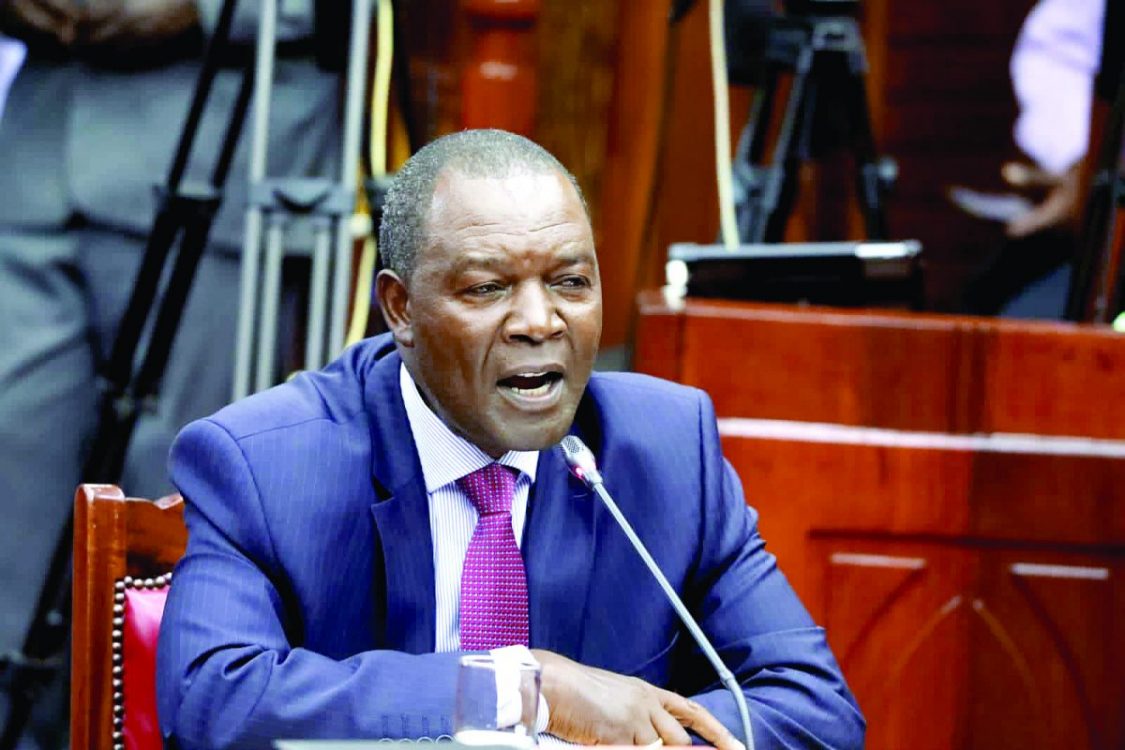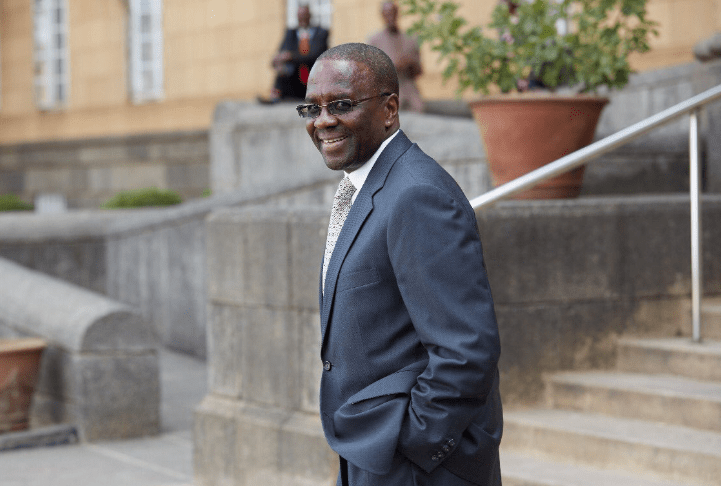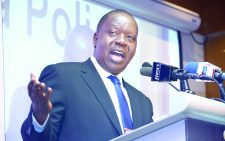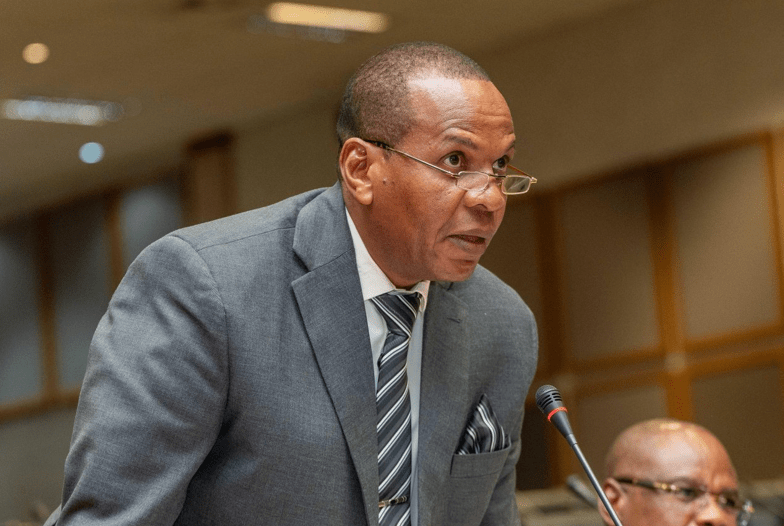Treasury seeks Sh30b loan as coffers run dry

The Government is hard pressed to raise funds and meet its financial obligations, with demand for money appearing to have outweighed its expenditure.
The latest indicator is that of a Sh30.2 billion overdraft facility they opted for from the Central Bank of Kenya (CBK), signalling a dire need for finances.
National Treasury Cabinet Secretary Professor Njuguna Ndung’u yesterday confirmed that the government is broke and struggling with limited resources, warning that counties will now be forced to wait for even longer to receive disbursement of shareable revenue.
Sources told the People Daily that the government has been forced to put on hold several projects and other services due to the cash crunch.
Speaking on the side-lines of a Senate induction workshop in Mombasa, Prof Ndung’u said treasury is currently financially strapped and cannot end the prolonged stalemate with governors that has seen paralysis in most of devolved units.
“We don’t have money, we have shortage of resources, we ask them to wait because we are in a financial hole, that is why we want to tell them to wait as a solution is being found,” said Ndung’u.
The Treasury CS also asked members of Parliament awaiting the NGAAF allocation to be patient. County women representatives and members of Parliament have decried delays in the disbursement of the funds to give out bursaries to needy pupils.
The CS made the confession as the standoff between governors and the National Treasury over Sh425 billion revenue allocations threatens to paralyse services in the 47 counties.
Counties are still owed an outstanding Sh103 billion in equitable share balances for the 2022/23 financial year.
Another 16 are in dire straits after reportedly not having received cash disbursement from the National Treasury since October last year, a situation governors say is affecting provision of services especially ECDE teachers, who have rejected a new salary scheme proposed by the Salaries and Remuneration Commission (SRC) that reduces their salaries from a maximum of Sh20,000 to a minimum of Sh7,836.
Untenable demands
The Council of Governors (CoG) is holding out for Sh425 billion in County Shareable Revenue (CSR) for the financial year 2023/2024, while the Commission on Revenue Allocation (CRA) has recommended Sh407 billion while the National Treasury said it can only afford Sh380 billion, even as Deputy President Rigathi Gachagua said the governors’ demands were untenable, amid a burgeoning pending bill in excess of Sh85 billion.
“Ile pesa ambayo iko ni Sh380 billion hata mukitutoa nguo mutuchape hiyo ndio iko,” DP Gachagua told the CoG in Mombasa. Loosely translated it means that the Government can only afford Sh380 billion out of the Sh425 billion the senators are demanding. That even if senators decided to strip naked or flogged the Central Government, nothing more would be forthcoming. “We can’t say they will get it today or tomorrow, we have financial constraints,” said Ndung’u, adding that a lot of money is needed to financé the Kenya Kwanza economic blueprint.
Speaking in Mombasa yesterday Ndungu said the matter will be discussed amicably in an oncoming governors’ summit.
“That is an issue that is going to be decided in the summit, we cannot discuss it in the media,” Ndungu said in response to a question about disbursement of county allocation.
A section of governors has warned that health services are among services that have been adversely affected due to failure by the National Treasury to release the money meant to fund devolved operations this week.
They are demanding at least Sh425 billion as shareable revenue to the 47 devolved units but Treasury has committed Sh370 billion, a shortfall of Sh55 billion.
In September last year, President William Ruto directed the National Treasury to slash Sh300 billion from the Financial Year 2021/22 budget in order to realise savings.
As a result of the cash crunch, the government has delayed to disburse money to counties, the Higher Education Loans Board, capitations for primary secondary education and and several state corporations. The government only released part of the HELB, and school capitations money last week.
Snail’s pace
At the Immigration department, printing of new passports has been at a snail’s pace after one of the machines broke down, a similar scenario at the National Transport and Safety Authority (NTSA) where the number of pending applications for driving licenses continues piling.
Payment of pending bills both for national and county governments have also been put on hold as the cash crunch continues to bite.
Sources say in the National Police Service, service commanders have not been provided with funds for operations, almost crippling their services.
The government is also said to have put on hold a countrywide police recruitment exercise due to lack of money.
Ronny Chokaa, a research analyst with investment bankers, Genghis Capital, told the Business Hub that the primary reason the government could be short of cash was due to the timing differences in receipts of actual cash flows against budgeted projections.
In the first quarter of the Financial Year 2022/23 the office of Controller of Budget (CoB) reported an actual tax and non-tax receipts that collectively stood at 19.3 per cent of total projected expenditures.
“This is low in comparison to the pro-rated target of 25 per cent, meaning that tax collection efforts are not pacing up as fast,” Chokaa said.
Debt obligations
He said in the face of rising debt-servicing costs, expected to rise to Sh1.4 trillion this financial year and double to Sh2.1 trillion in four years, as well as the need to retire maturing debt obligations and pending bills on a timely basis, pressure is also piling on Treasury to honour these obligations.
CBK figures placed the public debt stock at Sh8.7 trillion as of September 2022 and expected to rise to Sh9.4 trillion by June 2023.
The CBK overdraft is relatively inexpensive, accessible and convenient to meet priority and urgent expenditure needs and comes in handy when the Government is experiencing financial stress.
Intuitively, said Chokaa, the government has to accelerate tax collection efforts so as to meet their set targets.
Dr Ruto’s administration targets to collect Sh4.8 trillion by June 2027 by weeding out tax cheats through linking its tax collection systems to mobile financial platforms.
In the next fiscal year, the government intends to collect Sh2.9 trillion from domestic taxes, including Sh2.8 billion from the informal sector.
Furthermore, Chokaa said access to concessional financing in the international markets such as Special Drawing Rights (SDR) from the International Monetary Finance (IMF) should offload the cash crunch pressure “at least for the foreseeable future.”
The Treasury CS said the government is determined to ensure bottom up economic transformation becomes a reality despite the tough economic shocks posed by national catastrophes.
The meeting held at Pride In resort seeks to understand the role of the committee, understand the place of the committee in legislation, and also develop a work plan for 2023-24.
Other sustainable options call for structural improvements to promote exports, whilst substituting imports so as to preserve national capital, said the analyst.
The Treasury CS said the government is determined to ensure bottom up economic transformation becomes a reality despite the tough economic shocks posed by national catastrophes.
“We have seen a decline in Agriculture productivity, the drought and famine affecting the country and the shocks of COVID 19 pandemic, we are trying to get out of that and ensure a robust economic recovery and make the bottom up economic agenda a reality,” said Ndung’u.
The meeting held at Pride In resort seeks to understand the role of the committee, understand the place of the committee in legislation, and also develop a work plan for 2023-24.







